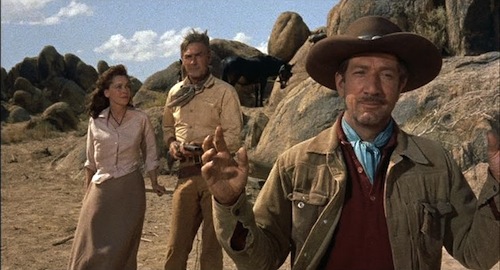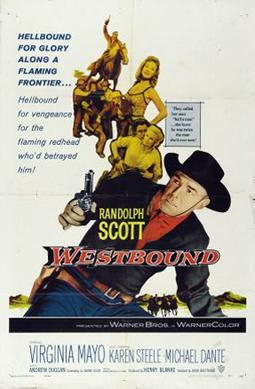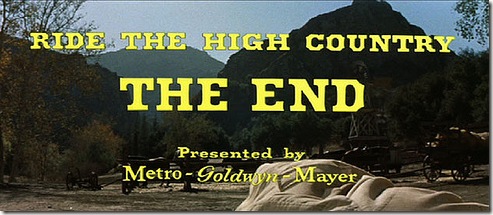RANDOLPH SCOTT: The Paramount Years, 1932-1938 can be read here.
RANDOLPH SCOTT: Western Star, 1938-1945 can be read here.
RANDOLPH SCOTT: The Man in the Saddle, 1946-1956 can be read here.
Anthony Mann recaptured some of this sparseness. Ford moved right away from it. Boetticher Westerns, RIDE LONESOME and COMANCHE STATION for instance, have a certain style, helped by Randolph Scott who physically was not at all like the soft heroes of the period. Boetticher tends to avoid towns and isolate his characters, and his heroes fairly consistently avoid involvement with women. But in Boetticher the violence is casual, the heroes and villains continually facing a gamble on life and death which is accepted philosophically.
---- There Must Be A Lone Ranger --
Jenni Calder
By the early '50's, Randolph Scott, as one of the top ten box office stars, had reached the peak of his popularity. But the best was yet to come.
From 1956 through 1960, Scott starred in seven films directed by Budd Boetticher that collectively made Western film history. Most were produced by Harry Joe Brown, were filmed by the Scott-Brown production unit (Ranown), and four of the scripts were written by Burt Kennedy, who also did uncredited repair work on a couple of the other scripts.
In these films Scott is at his peak as an actor. Although he was in his late fifties when the series began, he did not show it. As the years had passed his weather-beaten features, dignified voice and manner, coupled with his improved acting, had made him appear even more authentically a man of the West.
In many ways the Scott-Boetticher films were a throwback to the silent films of William S. Hart and Harry Carey. They were sparse, lean films with mature plots that usually found the hero embroiled in a solitary quest, avenging wrongs, and never riding around anyone or anything.
Boetticher, like Scott, launched his career in the "B's." His first film as director was a non-Western, ONE MYSTERIOUS NIGHT (Columbia, 1944), an entry in the Boston Blackie series, starring Chester Morris; his first Western was a B-Western, THE WOLF HUNTERS (Monogram, 1949), starring Kirby Grant.
In the Western genre Boettcher followed his initial effort with THE CIMARRON KID ( UI, 1952, starring Audie Murphy); BRONCO BUSTER (UI, 1952, starring John Lund and Scott Brady); HORIZONS WEST (UI, 1952, starring Robert Ryan and Rock Hudson); THE MAN FROM THE ALAMO (UI, 1953, starring Glenn Ford); and WINGS OF THE HAWK (UI, 1953, starring Van Heflin).

SEVEN MEN FROM NOW (Batjac/WB, 1956)
DIRECTOR: Budd Boetticher; PRODUCERS: Andrew McLaglen, Robert E. Morrison, John Wayne; WRITER: Burt Kennedy; CINEMATOGRAPHER: William H. Clothier
CAST: Randolph Scott, Gail Russell, Lee Marvin, John Larch, Walter Reed, Donald Barry, Stuart Whitman, Pamela Duncan, John Berradino, Cliff Lyons, Chuck Roberson, Fred Graham
The first of the Scott-Boetticher films is technically not a Ranown film, but was produced by John Wayne's Batjac Productions and distributed by Warner Brothers.
I earlier reviewed the film as one of my "Top 21 Favorite Westerns," which I rated as number 14. Some days I think it should be rated higher. You can read the review here.
![[t3.jpg]](https://blogger.googleusercontent.com/img/b/R29vZ2xl/AVvXsEg14qsxbJ97_BANJLjl5tByx6_e9BPnnq6s74NfYNy0hKU63Pc08JLIFWJ8j-n7KMRPMNAJLncRqwPPibAsmngpt7EZQKsIu2Nm0-ALtTtd5GvG70BEQhNPepQfZ0oHoX5koIbyWJ9RVTw/s400/t3.jpg)
THE TALL T (Ranown/Columbia, 1957)
DIRECTOR: Budd Boetticher; Writers: screenplay by Burt Kennedy based on Elmore Leonard's story, The Captives; PRODUCER: Harry Joe Brown; CINEMATOGRAPHER: Charles Lawton, Jr.
CAST: Randolph Scott, Richard Boone, Maureen O'Sullivan, Arthur Hunnicutt, Skip Homeier, Henry Silva, John Hubbard, Robert Burton
The second Scott-Boetticher collaboration was another top-notch Western. The title was never satisfactorily explained -- not even by the writer or the director. In the studio's ad campaign it implied that the "T" stood for terror, but no one seemed to know for sure. The title of the original story, written by Elmore Leonard, was The Captives. However, that title had already been registered and the studio stuck the other title on the picture.
Regardless of the confusion concerning the title, the film is a classic in the medium-budget category, is one of Scott's finest, and one of the best Westerns of the '50's.
Boetticher is on record as saying that in these films he wanted to give Scott's adversaries equal time and it was made easier by the fact that Boetticher also said that Scott was the most unselfish star that he knew. It is one of the primary reasons why these films rise above most of the Westerns of that era. And it worked especially well when the adversary was somebody like Lee Marvin or Richard Boone.

In the film the credo of the Scott hero is established when he tells Miss O'Sullivan that "there are some things a man can't ride around." This was not a new theme in Westerns, of course, for many classic Westerns dealt with the theme. But this theme, along with the revenge motif, was the basic underlying feature of the Scott characterization down through the years, but especially in the Boetticher films.
 |
| O'Sullivan, Scott, and Boone |

DECISION AT SUNDOWN (Ranown/Columbia, 1957)DIRECTOR: Budd Boetticher; PRODUCER: Harry Joe Brown; WRITERS: screenplay by Charles Lang based on story by Vernon L. Flaharty; CINEMATOGRAPHER: Burnett Guffey
CAST: Randolph Scott, John Carroll, Karen Steele, Valerie French, Noah Beery, Jr., John Archer, Andrew Duggan, James Westerfield, John Litel, Ray Teal, Vaughan Taylor, Richard Deacon
The story for this film was not written by Burt Kennedy, but was one that the director inherited. He was later quoted as saying that Charles Lang did his best to shape it, but that he didn't think that Lang had been entirely successful in his efforts.
Boettcher didn't like the fact that the story is confined to the town of Sundown. He much preferred to incorporate his characters into the landscape of the Alabama Hills out near Lone Pine, California. He also complained that the script did not allow any clear resolution at the end. In short, it wasn't his kind of Western.
Despite Boetticher's reservations, Scott liked the film -- and so do I. My own feeling is that the director was too harsh in his criticism. It was a change of pace for the director and his star, but the result was a fascinating psychological study of a man on the revenge trail, as usual, but who finally realizes that he is in the wrong.
The plot finds Scott in search of another villain, this time portrayed by John Carroll, who was responsible for luring Scott's wife away from him, and whom Scott unfairly blames for her subsequent suicide. There is a poignant scene when Scott's pal, portrayed by Noah Beery, Jr., apprises Scott of the fact that his wife had never been any good, anyway. Scott is exceedingly believable as a husband who deep down knows his friend is right, but is unwilling to accept his wife's unfaithfulness.
Beery, always underrated as an actor, and much misused during his career, added a great deal to the film with his Will Rogers physical appearance and manner.
 |
| Noah Beery, Jr. |

BUCHANAN RIDES ALONE (Ranown/Columbia, 1958)
DIRECTOR: Budd Boetticher; PRODUCER: Harry Joe Brown; WRITERS: screenplay by Charles Lang, Jr. and Burt Kennedy (uncredited) based on Jonas Ward's novel, The Name's Buchanan; CINEMATOGRAPHER: Lucien Ballard
CAST: Randolph Scott, Craig Stevens, Barry Kelley, Tol Avery, Peter Whitney, Jennifer Holden
Boetticher was much happier with this film than he was with DECISION AT SUNDOWN, partly because the landscape, the area in and around Old Tucson, Arizona, was much closer to his vision of what he wanted in a Western film. And it is a fairly good film that deals with Scott's confrontation with a family that controls a border town. The cast, however, was not a strong one. It was especially weakened by the fact that Scott's main adversary is not portrayed by a Lee Marvin or a Richard Boone, or even a Forrest Tucker, but by the much too urbane Craig Stevens.
However, in comparison to what came next it was quality entertainment.

WESTBOUND (WB, 1959)
DIRECTOR: Budd Boetticher; PRODUCER: Henry Blanke; WRITERS: screenplay by Berne Giler based on story by Giler, Albert S. Vino, and Burt Kennedy (uncredited); Cinematographer: J. Peverell Marley
CAST: Randolph Scott, Virginia Mayo, Karen Steele, Michael Dante, Andrew Duggan, Michael Pate, Wally Brown
This film was made because Scott discovered that due to an earlier contractual agreement he owed Warner Brothers a final film. Boetticher, proud of what he and Scott were accomplishing and wanting to protect his star became involved in the project because he volunteered to direct it. However, there was a limit to what he could do.
Warner Brothers was quite adept at making a certain kind of picture, but not Westerns. It is true that a few quality Westerns bearing the Warners' logo had been produced, but practically all of them, SEVEN MEN FROM NOW is an example, were filmed by independent production units and were then distributed by that studio. Many of the weakest of the Scott vehicles of the past had been full-fledged Warners productions -- and such was the case with WESTBOUND. It is the weakest of the Scott-Boetticher films, but better than those Scott had made for the studio earlier in the decade.
Scott does what he can with the role and receives his best support from second female lead Karen Steele and from Michael Pate, who portrays a gunman leading a gang of outlaws. Since it is a Warner Brothers film it is no surprise that it is beautifully photographed, in this case by Peverell Marley, who had been filming movies for forty years. However, the film is done in by a clunky plot.

RIDE LONESOME (Ranown/Columbia, 1959)
DIRECTOR: Budd Boetticher; PRODUCER: Budd Boetticher; EXECUTIVE PRODUCER: Harry Joe Brown; WRITER: Burt Kennedy; CINEMATOGRAPHER: Charles Lawton, Jr.
CAST: Randolph Scott, Karen Steele, Pernell Roberts, James Coburn, James Best, Lee Van Cleef, Boyd Morgan, Roy Jenson, Boyd Stockman
RIDE LONESOME, the best of the Scott-Boetticher collaborations, got things back on the right track. Although the story again features Scott in pursuit of revenge, it does so in a different fashion.
I rank it number twelve on my list of "Top 21 Favorite Westerns," and you can read a full review of the film here.
 |
| Equal adversaries: Pernell Roberts and Randolph Scott |

COMANCHE STATION (Ranown/Columbia, 1960)
DIRECTOR: Budd Boetticher; PRODUCER: Budd Boetticher; EXECUTIVE PRODUCER: Harry Joe Brown; WRITER: Burt Kennedy; CINEMATOGRAPHER: Charles Lawton, Jr.
CAST: Randolph Scott, Nancy Gates, Claude Akins, Skip Homeier, Richard Rust
Scott and Boetticher concluded their association on a high note with this excellent little film. It is a consistently taut and exciting tale with Claude Akins filling the Lee Marvin/Richard Boone/Pernell Roberts role.
I rated it number twenty-one on my "Top 21 Favorite Westerns" list and you can read the review here.
 |
| (Claude Akins and Nancy Gates) Where is Randolph Scott when you need him? |

RIDE THE HIGH COUNTRY (MGM, 1962)
DIRECTOR: Sam Peckinpah; PRODUCER: Richard E. Lyons; WRITERS: N.B. Stone, Jr. and Sam Peckinpah (uncredited); CINEMATOGRAPHER: Lucien Ballard
CAST: Randolph Scott, Joel McCrea, Mariette Hartley, Ron Starr, Edgar Buchanan, R.G. Armstrong, Jenie Jackson, James Drury, L.Q. Jones, John Anderson, John Davis Chandler, Warren Oates, Byron Foulger, Percy Helton
With the release of COMANCHE STATION Boetticher went off to Mexico on an ill-fated venture to film the ultimate bullfight film and Scott, reportedly one of Hollywood's wealthiest citizens, decided it was time to call it quits. Although he was in his early sixties (he did not look it), he could have continued as a star, much like John Wayne, for some years to come. In fact, he looked more like an even more authentic Westerner in the later years than he did at the beginning, or for that matter, in the middle years of his career.
 |
| (L-R): Mariette Hartley, Randolph Scott, Joel McCrea, and Ron Starr ride the high country. |
I rate it number five on my list of "Top 21 Favorite Westerns" and here is where you can read my review.
After RIDE THE HIGH COUNTRY, Randolph Scott unsaddled his horse and put it out to pasture. He could reflect on a film career that spanned thirty-four years, thirty as a leading man. He appeared in sixty-three Westerns, sixty as the leading man, and one as co-star.
In his career he appeared in fifty-two A-Westerns, starring in forty-nine. No other Western star can match that statistic. With few exceptions his films were tightly-knit, fast-paced, medium-budget productions -- the kind that they just don't make anymore.
 |
| (1898-1987) |



.jpg)



